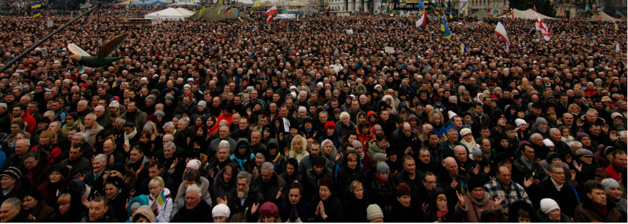
Credits : RR
Patriotism has become the driving force of Maidan, the authority's independent land in central Kiev. These protests were marked by shouts of "Glory to Ukraine" and the national anthem "Ukraine has not yet Perished". The demonstrators carried the nation's colours of yellow and blue. Meanwhile, on television, the world was watching US Assistant Secretary of State Victoria Nuland hand out cookies on Maidan without knowing that the volunteers had fed those present for free. The mass voluntary movement was born when people themselves began to collect things that people needed, all at their own cost.
The roots of a strong national sentiment
According to the sociological group Ratings, 86% of Ukrainians today consider themselves patriots and wish for membership in the European Union. After Russia's annexation of Crimea and its aggression in East Ukraine, many Ukrainians experienced a feeling of solidarity. Patriotism reverberated across Ukraine following Russia's annexation of Crimea, invasion of Donbass and its forced submission of the country, taking away its wishes of liberty and democracy.
Ukraine has always been a country coveted by its neighbours and current events confirm that this has not changed. In the times of imperial Russia, those who desired a free life escaped to Ukraine, thus fleeing the yoke of royal officials. They formed a Cossack republic known as the Zaporizhian Sich, where the highest republican authority, the vetché, ruled. For many historiographers, the survival of the Ukrainian people remains a mystery.
Real-time heroism
Modern Ukrainian patriotism is represented by the Heaven's Hundred, Ukrainian heroes who were shot down by the police. Before February 18, 2014, nine people total had died. From February 18 to 21, 17 people died from injuries during clashes. Although adults are concerned, the majority of victims are children and mostly residents of West Ukraine.
The film The Winter That Changed Us, a series of documentaries on the events that took place in Euromaidan during the Revolution of Dignity, was done to perpetuate the memory of the sacrifice of hundreds of Ukrainian heroes. The sequence of events of last year's winter shocked numerous spectators around the world who did not have access to Ukrainian media at the desired time. Regarding the real-time feat, these are people fighting in Donbass for Ukraine's integrity by defending European democratic values.
According to the data from the United Nations (UN), over 7,000 have been killed in East Ukraine. Volunteers have been playing a large role since the beginning of military operations involving training and provisions. Because of corruption and bureaucracy, the government seems to have not succeeded in accomplishing its duties.
The false patriotism embodied by the authority
Aside from popular Ukrainian patriotism, there is also a false national sentiment embodied by the modern Ukrainian authority. Nowadays, the new bosses of Kiev often act in the same ways against which they protested one year ago on Maidan. They limit the freedom of the press and try to eliminate opposition. One year ago, many Ukrainian journalists protested against corruption, the intimidation of opposition politicians and the oligarchs' total control over the media. After the flight of president Viktor Yanukovych, the oligarchy did not disappear and the magnitude of corruption has grown. At the same time, past opponents who have taken government positions, continue to behave as before by trying to suppress all criticism and limit freedom.
The consolidation of the Ukrainian people
The people of Ukraine show their love and devotion to their country. Previously, if people wore traditional garb (vyshyvanki) it was exclusively for holidays such as Independence Day of Ukraine, now, they constantly wear Ukrainian national clothing. Whether at work, at school or simply to go for a walk, they go out wearing ribbons or national symbols. They paint bridges and palisades everywhere in the same colours. Even when leaving home, you hear citizens greeting each other differently: Instead of a simple handshake, the words of welcome are: "Glory to Ukraine" and the response "Glory to the heroes".
Since the events in Maidan, values of responsibility, will and national solidarity hold an increasingly important place in each Ukrainian's heart. Their mentality shows that they feel European and want democracy. They differ from their eastern neighbours who are used to centralised despotism and obedience to a "good tsar". According to a well-known French proverb, each nation deserves its leader. Today many wonder, "Why do people as worthy as the Ukrainians have such unworthy leaders who are unwilling to change the lives of their citizens?"




























